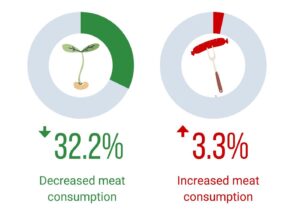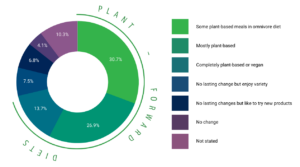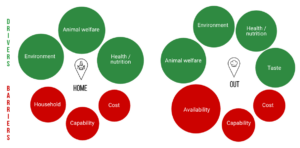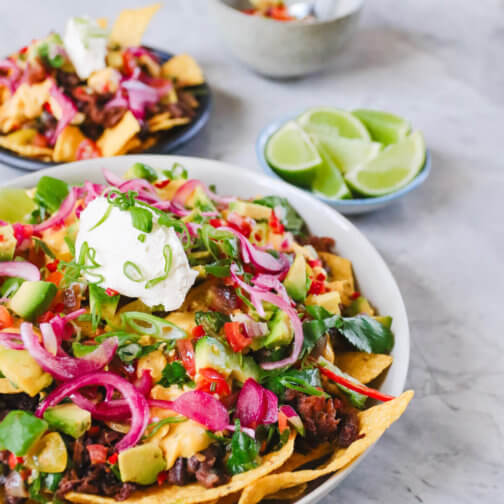
A coalition of universities in partnership with Nourish plant-based living has taken the pulse of consumers on plant-based eating in the largest Australian survey of its kind.
Running from 1 January to 20 March 2022, the study led by Dr Carla Riverola at Griffith University received 3016 responses from Australian adults, yielding one of the largest data sets of its kind on consumer behaviour and attitudes to plant-based eating.
Key findings were released by the researchers in August, and a report detailing the key insights has just been published. Here are the top five takeaways.
Spoiler alert: the plant-based future is now!
1. Aussies are cutting down on meat
32.2 percent of the sample said they had reduced their meat consumption in the past year, compared to just 3.3 percent who reported an increase.
This echoes the results of a UK survey which found 30 percent of Brits were consciously eating less meat to mitigate their climate footprint in response to the unprecedented European 2022 summer heatwave.

Similarly, a 2021 study found that 25 percent of Australians and 32 percent of New Zealanders were actively reducing their meat consumption, with more still planning to do so.
2. Health motivations come top
When it comes to the drivers for reducing or ditching animal products, the new research found that health is number one: among those who reported reducing their meat consumption in the last year, 69 percent included health reasons among their motivations.
This tallies with previous research showing that health is the main entry point to plant-based eating. And it’s little wonder: there is a large and ever-growing scientific consensus that eating more plants optimises overall diet quality, enhancing both lifespan and healthspan.

3. And ethics are a high priority, too
While health is the most common reason for switching to a more plant-based diet, other factors matter too. Almost half the respondents who have reduced or dropped meat from their diet cited environmental reasons (49 percent), with animal welfare (44 percent) and ethical concerns (40 percent) also high on the list.
Popular documentaries such as Cowspiracy, Seaspiracy, and Eating our Way to Extinction explore the outsized environmental impacts of eating animals, while the seminal films Earthlings and Dominion show the confronting realities of life and death for animals used in agriculture. Films like these are playing an important role in raising awareness of the facts behind our food, which is also increasing thanks to social media, news stories, and impactful campaigns by nonprofit organisations such as Animals Australia and Edgar’s Mission.
4. The plantward slant
The Griffith survey asked the meat reducers about their future dietary aspirations, and found that over 70 percent aspire to plant-forward diets, defined as either completely plant-based (13.7 percent), mostly plant-based (26.9 percent), or aiming to incorporate some plant-based meals as part of an omnivorous diet (often described as a “flexitarian” approach – 30.7 percent). A further 14.3 percent of the reducers indicated that they are open to plant-based foods, reporting that they like trying new plant-based products, or that they enjoy variety.

This clear leaning towards plant-forward diets has been seen in other surveys of Australian consumers. For example, PWC data from 2021 found 34 percent of Australians as a whole aspired to become vegan or vegetarian in the following 12 months.
5. Overcoming obstacles
The survey revealed some interesting findings about the main barriers to eating plant-based food, both at home and when eating out.
At home, a lack of support from household members was the most common barrier, which goes to show that at home the ‘meat vote’ often carries – a finding backed up by previous research. This is where recipe creators like Amanda Logan can be a fantastic resource. As the only vegan in an omnivorous family, she specialises in bringing her partner and kids along for the ride with easy veganised versions of familiar recipes, designed with meat lovers in mind.
By contrast, when eating out, the main obstacle was limited availability and variety of plant-based options. This may mean that restaurants that don’t offer enough vegan options are subject to the ‘plant-based veto vote’ – missing out on potential business.

*Note: Capability as a barrier at home was identified by the statement, “I don’t know how to prepare appealing plant-based meals,” and in the eating out context as, “Appealing plant-based dishes are difficult to identify on the menu.”
In the words of lead researcher Dr Carla Riverola, “These results highlight a significant opportunity for restaurants to attract plant-forward and curious diners by making sure there are great vegan options on the menu. Having just one vegan or vegetarian dish on offer just isn’t going to cut it any more.”

Researchers Dr Stephen Harrington and Dr Carla Riverola with chef Vincent Estacio at NAIM restaurant, Brisbane, which offers extensive plant-based options, attracting vegan and plant-curious customers alike. Image: Xavier Montaner, Photogenia
***
To dig further into the insights, view the ‘Consumer views on Plant-based foods Australian sample’ summary report here.





















